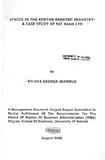| dc.description.abstract | The study was carried out with the aim of establishing the state of ethics in the
Kenyan Banking industry. It was also to determine staff and customers'
perception of the ethicality of NIC Bank Limited, and to establish whether
customers, middle & junior level staff, and senior management staff differ in
their perception of the ethicality of NIC Bank Limited.
In order to achieve this, a uniform interview guide combined with a structured
questionnaire was administered to the three classes of respondents. The
respondents comprised 14 Junior/Middle level staff, 6 Senior Management staff,
and 20 Customers. A mixture of random and non-random methods was
employed to select respondents for the study.
Qualitative data was captured in interviewer note pads and tapes, and analyzed
using content analysis. Quantitative data was captured using a 5-point likert
Scale and analyzed using mean scores at all response levels namely Ethical
Issues, Respondent Class and Aggregate / Study Statistics
From the findings of the study, the following conclusions can be made. First, the
concept of Ethics is well appreciated in the Kenyan Banking Industry. Secondly,
Customers, Junior/Middle level staff and Senior Management members of staff
perceive NIC Bank Limited as an ethical Bank, characterized by unethical
. practices to a very little extent. Thirdly, significant differences exist in
Customers', Junior/Middle level staff, and Senior Management staff perception of
the ethicality of NIC Bank Limited.
The results also demonstrate that the industry players have taken deliberate
steps to deal with ethical issues'in the industry. Banks have in place elaborate
Human Resource policies and Codes of Ethics to guide and regulate the behavior
ix
of its employees and directors. The Kenya Bankers Association has in place 'The
Banking Code', which is a voluntary code of ethics to be adhered to by its
members. The Central Bank of Kenya in its position as the industry regulator has
in place measures to tame Banks should their unethical behaviors border on
illegality.
From the same findings, we find that there is a whole range of ethical issues that
cannot be safely ignored, not only in the Banking Industry, but also perhaps in
other sectors of the economy. The Results should however be interpreted
against the limitations of the study, particularly the confidential nature of the
Banking industry. | en |

